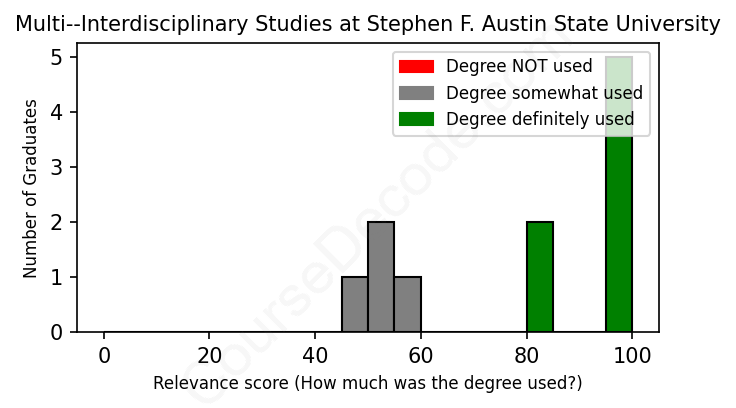
First, some facts. Of the Multi--Interdisciplinary Studies graduates from Stephen F. Austin State University we've analyzed , here's how many have used (or NOT used) their degree in their career:

These are estimates based on AI analysis of 11 LinkedIn profiles (see below).
The verdict? Significantly above average. Overall, with an average relevance score of 78%, Multi--Interdisciplinary Studies graduates from Stephen F. Austin State University have a much higher likelihood (+11%) of finding work in this field compared to the average graduate across all fields:
And for comparison, here's the chart for all profiles we've looked at across all degrees.
Also, after graduating, 45% of these graduates have pursued further education other than another Bachelor's degree (such as a Masters degree or other), compared to the average across all profiles of 35%. This suggests you may need more than just a Bachelors degree to be competitive as a Multi--Interdisciplinary Studies graduate.
See the details:
|
Relevance score: 81% We think this person has gone into a career highly relevant to their degree. We think this person has gone into a career highly relevant to their degree.
DEGREE INFOGraduated in 2015 from Stephen F. Austin State University with a Bachelor of Science - BS in Multi--Interdisciplinary Studies. Also pursued further education since (see below). JOB HISTORY SINCE GRADUATIONKindergarten Teacher Nacogdoches Independent School District Nov 2015 - May 2017 Reading Specialist  CENTER ISD Aug 2017 - Jun 2022 Instructional Materials Reviewer  Texas Education Agency Jan 2018 - Jun 2022 Effectiveness Coach  TNTP Aug 2021 - Jun 2022 Primary Literacy Coach  Uplift Education Jun 2022 - Oct 2023 Primary STEM Curriculum and Instruction Specialist  Uplift Education Jul 2023 - Present FURTHER DEGREES DONE SINCE GRADUATINGMaster of Education - MEdStephen F. Austin State University 2017 - 2019 ABOUTI am a highly skilled and enthusiastic Reading Specialist with 8 years of educational experience assisting students of varying ages in facing and overcoming reading difficulties. I hold a Master's degree in Elementary Education with a Reading Specialist Certification from Stephen F. Austin State University. My expertise lies in coordinating MTSS and facilitating professional learning in early literacy development to guide classroom instruction for all learners. My experience includes Kindergarten teacher, Special Education Resource K-3, Reading Interventionist servicing K-2nd grade and Collaborative Learning Facilitator at TNTP. I am currently a Primary Literacy Coach at Uplift Education. |
The top 10 most common jobs done by the graduates we've analyzed (ranked most common to least) are:
Here is a visual representation of the most common words in job titles for Multi--Interdisciplinary Studies graduates (this is across all Multi--Interdisciplinary Studies graduates we've analyzed, not just those who went to Stephen F. Austin State University):

Looking at the career trajectories of graduates from Stephen F. Austin State University with degrees in Multi-Interdisciplinary Studies, it’s clear that many have found their first jobs in education. Most graduates start as teachers in various school districts, indicating a strong inclination towards educational roles. For instance, several alumni were classroom teachers immediately after graduation, while others took on specialized roles, like instructional support and grant management, a few years into their careers. This suggests that the program effectively equips graduates with the necessary skills for teaching and educational administration, allowing for a smooth transition into the workforce.
As time goes on, many of these graduates continue to climb the ladder within the education field. After around five years, we see individuals taking on roles such as instructional specialists, grant managers, and even assistant principals. This progression signifies that they are not just finding jobs but are advancing in their careers by leveraging their degree. However, it's also worth noting that some graduates ventured into educational support roles or administration, which further diversifies their career paths. In general, graduates seem to be doing well for themselves, with a majority maintaining relevance in the field of education directly tied to their studies in Multi-Interdisciplinary Studies.
Honestly, a Bachelor's degree in Multi-Interdisciplinary Studies at Stephen F. Austin State University—or really any school—can be a bit of a mixed bag in terms of difficulty. It’s generally considered to be on the easier side compared to more hardcore majors like engineering or the sciences, mainly because you have a lot of flexibility in choosing courses from different disciplines that interest you. That said, it still requires some effort! You’ll need to stay organized and motivated to juggle multiple subjects, and if you go for a broad mix, it can get tricky trying to connect everything cohesively. Overall, if you're passionate about a bunch of different topics and enjoy learning in a less traditional way, you might find it pretty manageable!
Most commonly, in the LinkedIn profiles we've looked at, it takes people 4 years to finish a Bachelor degree in Multi--Interdisciplinary Studies.
Looking at the career paths of these Multi-Interdisciplinary Studies graduates from Stephen F. Austin State University, it seems like most of them are sticking with teaching and educational roles, which typically don’t pay as much as some other fields. For example, many of the teachers have started at the base level and have slowly worked their way up to administrative roles, like assistant principal or instructional specialist, which can lead to better salaries. However, a lot of their positions are in the public school system, where pay rates generally depend on years of experience and education level—so while they may have decent job stability and benefits, they might not be raking in the big bucks compared to other professions. Overall, it looks like they're making a reasonable living but probably not a fortune.
Here is a visual representation of the most common words seen in the "about" section of LinkedIn profiles who have a Bachelor degree in Multi--Interdisciplinary Studies (this is across all Multi--Interdisciplinary Studies graduates we've analyzed, not just those who went to Stephen F. Austin State University). This may or may not be useful:

Here are all colleges offering a Bachelor degree in Multi--Interdisciplinary Studies (ordered by the average relevance score of their Multi--Interdisciplinary Studies graduates, best to worst) where we have analyzed at least 10 of their graduates:
| College | Score | Count |
|---|---|---|
 Texas State University Texas State University
|
87 | 10 |
 Stephen F. Austin State University Stephen F. Austin State University
|
78 | 11 |
 University of North Texas University of North Texas
|
74 | 13 |
 Texas A&M University Texas A&M University
|
69 | 16 |
 The University of Texas at Arlington The University of Texas at Arlington
|
69 | 11 |
 University of Houston-Downtown University of Houston-Downtown
|
65 | 20 |
 University of Central Florida University of Central Florida
|
64 | 35 |
 The University of Texas at San Antonio The University of Texas at San Antonio
|
62 | 29 |
 Liberty University Liberty University
|
61 | 49 |
 The University of Texas at El Paso The University of Texas at El Paso
|
61 | 15 |
 San Diego State University San Diego State University
|
55 | 13 |
 West Virginia University West Virginia University
|
54 | 23 |
 Grantham University Grantham University
|
54 | 10 |
 Western Kentucky University Western Kentucky University
|
47 | 14 |
 Arizona State University Arizona State University
|
44 | 26 |
 Florida International University Florida International University
|
40 | 11 |